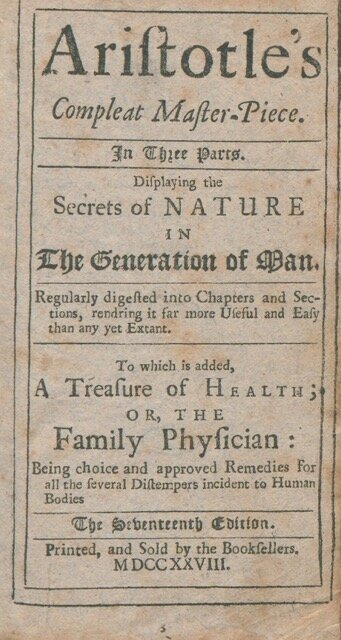Excerpts from “Aristotle’s Masterpiece”
The 1684 mash-up manual on sex, midwifery and sexual biology, commonly known as “Aristotle’s Masterpiece”, was consulted and procured through “independent booksellers” and through word-of-mouth from the 17th century up until the early 20th century. The manual boasts a title that is an allusion to Aristotle’s popular-culture reputation as a sex expert. This may have contributed to the expression “that of the Ancient Greeks” becoming somewhat of a joking reference to sex itself in such lofty places as Oxford University. By the early eighteenth century, the book also included recipes for household remedies and a guide to physiognomy. From this perspective, the book can be considered the forerunner of “What to Expect when You're Expecting.” “Artistotle’s Masterpiece” was, to the human mating ritual, a source of entertainment and biological knowledge.
Thus Man’s most noble Parts describ’d we see;
(For such the Parts of Generation be;)
And they that carefully survey’t, will find,
Each Part is fitted for the Use design’d:
The Purest Blood we find, if well we heed,
Is in the Testicles turn’d into Seed;
Aristotle Illustration: from a New York 1846 edition
And since it is natural in young people to desire these mutual embraces, proper to the marriage- bed, it behoves parents to look after their children, and, when they find them inclinable to marriage, not violently to restrain their inclinations (which, instead of allaying them, makes them but the more impetuous), but rather provide such suitable matches for them, as may make their lives comfortable; lest the crossing of their inclinations should precipitate them to commit those follies that may bring an indelible stain upon their families.
But when they are married, and their venereal desires satisfied by the enjoyment of their husbands, those distempers vanish, [these maids] become more gay and lively than before.
In the case of similitude, nothing is more powerful than the imagination of the mother; for if she fix her eyes upon any object, it will so impress her mind, that it oftentimes so happens that the child has a representation thereof on some part of its body.
And if, in the act of copulation, the woman earnestly look upon the man, and fix her mind upon him, the child will resemble its father. Nay, if a woman, even in unlawful copulation, fix her mind on her husband, the child will resemble him, though he did not beget it.


